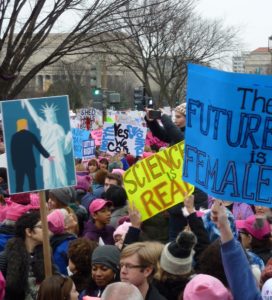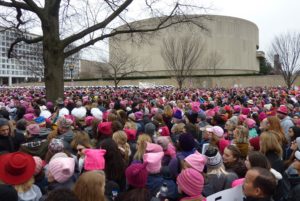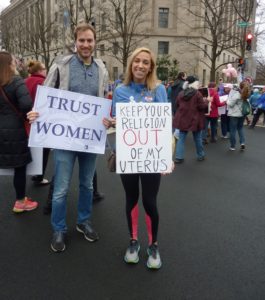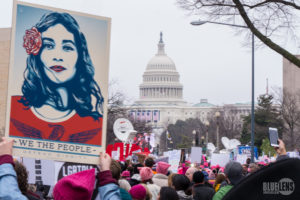Love, Hope, and Pride: Humanists at the Women’s March on Washington
The morning was still overcast from Inauguration Day, but there was excitement in the air. I felt it as I boarded a packed Metro train at 7:15 a.m. with dozens of women wearing pink “pussy hats” and carrying clever signs like “Keep Your Rosaries Off My Ovaries.” I was wearing my “Nasty Women Unite” sweatshirt and holding a stack of “Humanists for Women’s Equality” posters under my arm. The woman sitting next to me asked if I was giving them out. She thanked me as I handed her one and said, “Isn’t this going to be a great day?!”
 And indeed it was. When the American Humanist Association first heard of plans for the Women’s March on Washington, we immediately got involved. We were the first nontheist organization to be listed as a partner of the January 21 march, and soon after launched our Facebook event page inviting members of the AHA to join our marching group. As the day of the Women’s March drew close, we had nearly 200 people registered with the AHA.
And indeed it was. When the American Humanist Association first heard of plans for the Women’s March on Washington, we immediately got involved. We were the first nontheist organization to be listed as a partner of the January 21 march, and soon after launched our Facebook event page inviting members of the AHA to join our marching group. As the day of the Women’s March drew close, we had nearly 200 people registered with the AHA.
Our group met early at the Smithsonian station of the Washington Metro, located right on the National Mall. Over the course of an hour, our group grew to about thirty people and we began to march closer to the main stage, carrying our “Humanists for Women’s Equality” banner and “Humanists Are Proud Feminists” signs. People took our photos and extra signs, saying, “I’m a humanist too!”
 Unfortunately, because President Trump’s inaugural committee rejected requests for any rallies to be held on the National Mall (no surprise, considering Trump’s frail ego), we were ushered into the streets, already packed to the brim with Women’s March participants watching the action on jumbotrons. The hours-long rally began with passionate speeches by actress America Ferrera, activist and 2012 Humanist of the Year Gloria Steinem, and filmmaker Michael Moore. Carmen Perez, one of the co-organizers of the Women’s March, even said something worthy of our “Sounds Like Humanism” campaign: “We will not wait for some magical being to rise up and save us. We are not helpless. We are the ones we’ve been waiting for.” Humanists couldn’t agree more!
Unfortunately, because President Trump’s inaugural committee rejected requests for any rallies to be held on the National Mall (no surprise, considering Trump’s frail ego), we were ushered into the streets, already packed to the brim with Women’s March participants watching the action on jumbotrons. The hours-long rally began with passionate speeches by actress America Ferrera, activist and 2012 Humanist of the Year Gloria Steinem, and filmmaker Michael Moore. Carmen Perez, one of the co-organizers of the Women’s March, even said something worthy of our “Sounds Like Humanism” campaign: “We will not wait for some magical being to rise up and save us. We are not helpless. We are the ones we’ve been waiting for.” Humanists couldn’t agree more!
 As the morning went on, it was clear that the organizers, as amazing as they were to put this event together in record time, underestimated the number of people who would participate. They planned for 200,000 attendees, but the final number was over half a million. The streets were so crowded, the march portion of the event didn’t quite happen as they had planned, but that was OK, and lots of people still marched to Pennsylvania Ave. and made their way near the White House. Our message was heard loud and clear (even President Trump couldn’t help tweeting about it) by the media and millions around the world.
As the morning went on, it was clear that the organizers, as amazing as they were to put this event together in record time, underestimated the number of people who would participate. They planned for 200,000 attendees, but the final number was over half a million. The streets were so crowded, the march portion of the event didn’t quite happen as they had planned, but that was OK, and lots of people still marched to Pennsylvania Ave. and made their way near the White House. Our message was heard loud and clear (even President Trump couldn’t help tweeting about it) by the media and millions around the world.
Though I would have loved to stay for the entire event, our members and followers were expecting updates on AHA’s social media accounts, and cell service was blocked due to the sheer numbers near the National Mall and Independence Avenue where the stage was. When I arrived home, I immediately shared many of the pictures taken at the march, from our group picture at the Smithsonian station to humanists marching toward the rally starting point. There were funny signs (“Hope Not Grope”) and serious ones too (“Make America Think Again”). We also shared photos of AHA members in cities like San Jose, California; Des Moines, Iowa; and St. Augustine, Florida, who printed their own humanist signs and participated in Sister Marches across the country.
There was something you could certainly sense in photos but couldn’t truly experience unless you were there: a sense of solidarity, passion, and love. Attending the Women’s March on Washington was a true highlight of my activist life, and my heart is filled with hope and love for my fellow sisters (and brothers) looking for equality, justice, truth, and good governance. And we will put our efforts, our passion, and our strength toward achieving these ends.
Photos from the American Humanist Association’s participation in the Women’s March on Washington are available on Facebook. If you participated in the Women’s March on Washington, or the many Sister Marches across the country and abroad, share with us your thoughts and photos at write@thehumanist.com and we’ll publish them in a future article.

